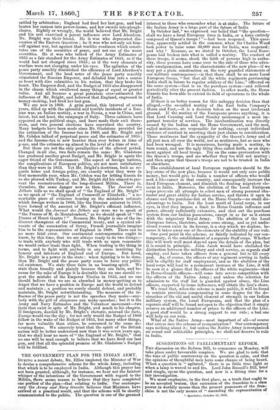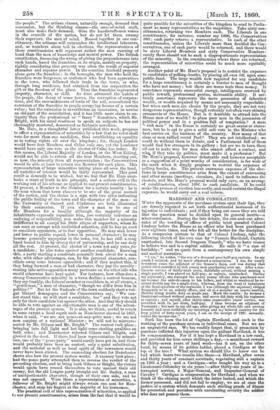SUGGESTIONS ON PARLIAMENTARY REFORM.
DIE discussion on the Reform Bill, to commence on Monday, will take place under favourable auspices. We are glad to note that the tone of public controversy on the question is calm, and that the opinions of thoughtful men have some chance of being heard. When a question is " agitated," there is as little true light as when a lamp is waved to and fro. Lord John Russell's Bill, brief and simple, opens the question, and now is a fitting time for a fair investigation.
We must emphasize, in the first place, as a truth that ought to be an accepted truism, that extension of the franchise to a ohms poorer in worldly means than the present possessors of the fran- chise is not the only means of " amending the representation of
• Spectator, October 15,1859.
the people." The artisan classes, naturally enough, demand that concession, but the thinking classes—the men-of-mind craft, must also make their demand. Give the handicraftsmen voices in the councils of the nation, but do not let them swamp their superiors, the men of mind. Massed together in one con- stituency, the artisans will outnumber the intellectual labourers, and, as numbers alone tell in elections, the representatives of these constituencies will represent rather the men cunning of hand than the men of knowledge and mental power.. The British constitution, foreseeing the wrong of giving the preponderance into such hands, based the franchise, in its origin, mainly on property, rightly considering that property was often the result of superior character and superior power. In the counties, freehold property alone gave the franchise ; in the boroughs, the men who held the franchise were burgesses, or craftsmen who had been apprentices in the town, who followed their trade in the town, or who, through long residence, had obtained from the corporation the gift of the freedom of the place. Thus the franchise represented property, character, or skill. As time advanced the habits of the people, the decay of some towns, the corruption of corpora- tions and the encroachments of lords of the soil, necessitated the extension of the franchise to people occupying houses of a certain value ; but the extension is nevertheless an innovation, in nowise an old part of the constitution, and it has little more claim to an- tiquity than the professional or " fancy" franchises, which Mr. Bright, with his usual readiness to speak on subjects he has not thoroughly mastered, denounced as fantastic novelties.
Mr. Hare, in a thoughtful letter published this week, proposes to effect a representation of minorities by a law that no voter shall vote for more than one candidate, thus establishing an equality as to voting rights all over the kingdom ; for, though London would have four Members and Caine only one, yet the Londoner would have only one vote as the elector of Caine has today. By this means, the Liberal Majority of London, or the West Riding, would not be able to return all the four Members, shutting out, as now, the minority from all representation ; the Conservatives would be able at least to return one Member for each place. This representation of large minorities taking place all over the land, all varieties of interest would be fairly represented. This good result is devoutly to be wished, but we fear that Mr. Hare over- looks a want of truth in his principle, and a serious evil in the working out of his scheme as applied to our present constituencies. At present, a Member is the Member for a certain locality : he is the man whom that town chooses to be one of the great council of the nation, and the choice is a sign with two sides indicating the public feeling of the town and the character of the man : as the University of Oxford. and Gladstone are both illustrated by their connexion. If you allow a man to be one of the Members for a locality although the majority of its inhabitants expressly repudiate him, you certainly introduce an unfixing of responsibility, you make this member for a minority indifferent to all except his little clique of supporters, whom he can coax or corrupt with undivided attention, and he has no need to conciliate opponents, _or to fear opposition. He may sink lower and lower in public regard, lower in personal character • he may become generally unpopular in the town, but he has still a snug band bound to him by strong ties of partnership, and he can defy all the rest. At present, the elector of a town not only votes for a candidate ; he also votes against another candidate. Knowing this, a party starting a candidate generally look about for a man who, with other advantages, can, by his personal character, con- ciliate away some intense opposition ; and if they neglect this, if they bring forward a man of bad character, they pay the penally : rousing into active opposition many partisans on the other side who would otherwise have kept quiet. For instance, how often does a strong Conservative minority in a town decline a contest because, they say frankly, the Liberal member or candidate is, at all events, a " gentleman," a man of character, " though we differ from him in politics ? " But let the Radicals of the town suddenly start a vul- gar blatant demagogue and the Conservatives say, " We can- not stand this ; we will start a candidate, too" and they vote not only for their candidate but against the other. And that they should be able to vote against an objectionable man is one of the advan- tages of the present system. It is also, we think, useful to retain to some extent a local esprit such as Manchester showed in 1857, when it said, " we are not peace-at-any-price men ; we are not men carping at a national Minister ; we will not be misrepre- sented by Mr. Gibson and Mr. Bright." The contest took place ; bringing into full light and hot light some sterling qualities on both sides ; and Manchester rejected Gibson and Bright, and gloried in the deed. If there had been representation by minori- ties, one of the " peace party" would surely have got in, and there would probably have been no contest, only a quiet substitution, and the national as well as local spirit of the townsmen would never have been stirred. The succeeding election for Manchester shows also how the present system works. A vacancy took place ; had the peace party attempted then to reverse the verdict of the preceding election, and to bring back Gibson or Bright, the victors would again have roused themselves to vote against their old enemy, but the old League party brought out Mr. Bailey, a man of unobjectionable character, though of their own side, and he was not opposed. Were there a representation of minorities, a follower of Mr. Bright might always retain one seat for Man- chester, and snap his fingers at the majority of his townsmen.
The practical evil of this representation of minorities, as applied t3 our present constituencies, arises from the fact that it would be quite possible for the minorities of the kingdom to send to Parlia- ment as many representatives as the majorities. Take sixty con- stituencies, returning two Members each. The Liberals in one constituency, for instance, number say 1000, the Conservatives 580 ; each party returns a representative. In each of the other constituencies, unless the Liberals more than doubled the Con- servatives, one of each party would be returned, and there would be sixty Liberal Members and sixty Conservative Members : surely there should not be such a disproportionate representation of the minority. In the constituencies where three are returned, the representation of minorities could be much more equitably arranged.
Another point of Mr. Hare's proposal is to restrict the expenses to candidates of polling-booths, by placing all over 501. upon some public fund. The large wealth now required for any candidate for a large constituency is certainly a barrier to men of thought who have not money; but there are worse tests than money. It sometimes represents successful energy, intelligence crowned by public reward, professional genius, mercantile ability. It cer- tainly sometimes represents the mere possession of inherited wealth, or wealth acquired. by means not necessarily respectable ; but when such men are chosen by the people, they are not very dangerous representatives, though certainly not often very shining ornaments of the House. But is it desirable to attract into the House men of no wealth ? to place poor men in the possession of political power and in a position full of temptation? A mere " rich man" in the House is certainly no great orator or states- man, but he is apt to give a solid safe vote to the Minister who best carries on the business of the country. How many of that class of men rallied round Peel? They are not intellectual ; we could do without them in debate; and a Parliament full of them would find few strangers in its gallery ; bat are we to turn them all out to make way for men who cannot afford a contest, and whq, if they take up politics, must make it a profession ? But Mr. Hare's proposal, however debateable and however acceptable as a suggestion of a point worthy of consideration, is far wide of the mark when it simply proposes to restrict the expenses of polling booths, &c. The present enormous expenses of the elec- tions in large constituencies arise from the extent of canvassing and other means (meetings, circulars, &c.) used to influence the electors, and Mr. Hare's proposal would only save on an average of constituencies, about 1001. to each candidate. If he could make the process of election less costly, and could restrict the illegal expenses, he would carry out a real reform.



























 Previous page
Previous page